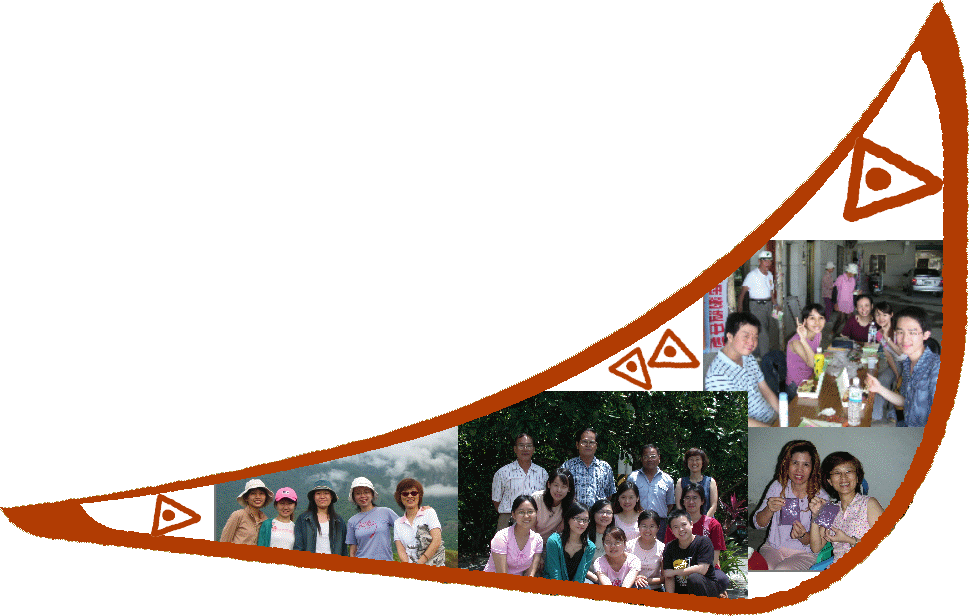


![]()




![]()

Course Content
Course Title: Linguistic Fieldwork
Instructor: Li-May Sung (limay@ntu.edu.tw)
Time: Spring 2006, Wed. 9:30am- 12:30am
Course Assistant: 郭政淳kuo.jona@msa.hinet.net
Office: GIL, Room 308
Office Phone #: 33664104 Ext 308
Course Description:
The purpose of the course is to give students first-hand experience and training in developing techniques for eliciting/transcribing/annotating linguistic data by working with a native speaker of a Formosan language that they (might) have never encountered before. The language of study this year will be Amis. The main emphasis will be on syntax, morpho-syntax, and semantic-syntax. Students will work on an individual project which can be on any aspect of the language in any linguistic theory/model/framework that they are familiar with or they have learned in the Syntax classes. In the end of the semester, a five-day field trip to the tribe village will be arranged. During this trip, students will be given chances to work intensively with more elderly native speakers and get closely acquaintance with the local people and culture.
Background Readings:
Field methods can only be learned from practical experience, but background reading can also be helpful. Here are some suggestions on field methods, analyzing a new language and linguistic typology:
Comrie, Bernard. 1989. Language Universals and Linguistic Typology : Syntax and Morphology. Chicago: University of Chicago Press,.
Bickford, J. Albert. 1998. Tools for Analyzing the World's Languages: Morphology and Syntax. Dallas: The Summer Institute of Linguistics.
Bouquiaux, Luc and Jacqueline M.C. Thomas (translated by James Roberts), Studying and Describing Unwritten Languages. 1992. Dallas, TX : Summer Institute of Linguistics.
Newman, Paul and Martha Ratliff. 2001. Linguistic Fieldwork. New York: Cambridge University Press.
Samarin, William J. 1967. Field Linguistics: A Guide to Linguistic Field Work. New York: Rinehart and Winston.
Vaux, Bert & Justin Cooper. 1999. Introduction to Linguistic Field Methods. Lincom Europa, LINCOM Coursebooks in Linguistics.
Blust, Robert. 2005. Austronesian languages. Encyclop?dia Britannica. Retrieved December 1, 2005, from Encyclop?dia Britannica Online School Edition http://school.eb.com/eb/article-9109806
Li, Paul. 2004. 台灣南島語言的分布和民族的遷移. Selected Papers on Formosan Languages, vol 2, 1017-1032. Taiwan: Academia Sinica.
Starosta, Stanley. 1995. A grammatical subgrouping of Formosan languages. Austronesian Studies Related to Taiwan. Taiwan: Academia Sinica.
Blust, Robert. 1999. Subgrouping, circularity and extinction: some issues in Austronesian comparative linguistics. Selected Papers from the Eighth International Conference on Austronesian Linguistics. Taiwan: Academia Sinica.
Himmelmann, Nikolaus P. 2002. Voice in western Austronesian: an update. The History and Typology of Western Austronesian Voice Systems. Australia: Placific Linguistics.
Ross, Malcolm. 2002. The history and transitivity of western Austronesian voice and voice-marking. The History and Typology of Western Austronesian Voice Systems. Australia: Placific Linguistics.
Requirements:
Everyone must participate in informant work, including recording/transcribing the data for class sessions and entering that data in a required format for our online database. In addition to the final term paper, one short midterm progress paper is required and two oral presentations are scheduled for students to report briefly their projects.
All students in the class will meet together for three hours a week. The first two hours will be spent eliciting data from our informant. The last hour students will present and discuss their work. All students must attend a five-day field trip scheduled in the end of the semester.
Class Calendar, Spring 2006
Week 1 Introduction to the course; email list; assign readings; text transcription sample/elicitationsample/coding lists/writing systems (pdf versions downloadable
fromhttps://ceiba.ntu.edu.tw/942fieldwork)
Week 2 data collection/in-class discussion
Week 3 data collection/in-class discussion
Week 4 data collection/in-class discussion
Week 5 data collection/in-class discussion
Week 6 data collection/in-class discussion
Week 7 4/5 NO CLASS
Week 8 data collection/in-class discussion
Week 9 data collection/in-class discussion
Week 10 data collection/in-class discussion
Week 11 1st oral presentation (20 mins per person); turn in a midterm paper (a short one; a
preliminary study on a selected topic, including references and literature review)
Week 12 data collection/in-class discussion
Week 13 data collection/in-class discussion
Week 14 one-to-one discussion with me
Week 15 5/31 NO CLASS
Week 16 field trip (five days)
Week 17 Preparation for the final oral presentation
Week 18 6/14 Last Class; 2nd oral presentation (20 mins per person); term paper due on 6/19 before NOON

